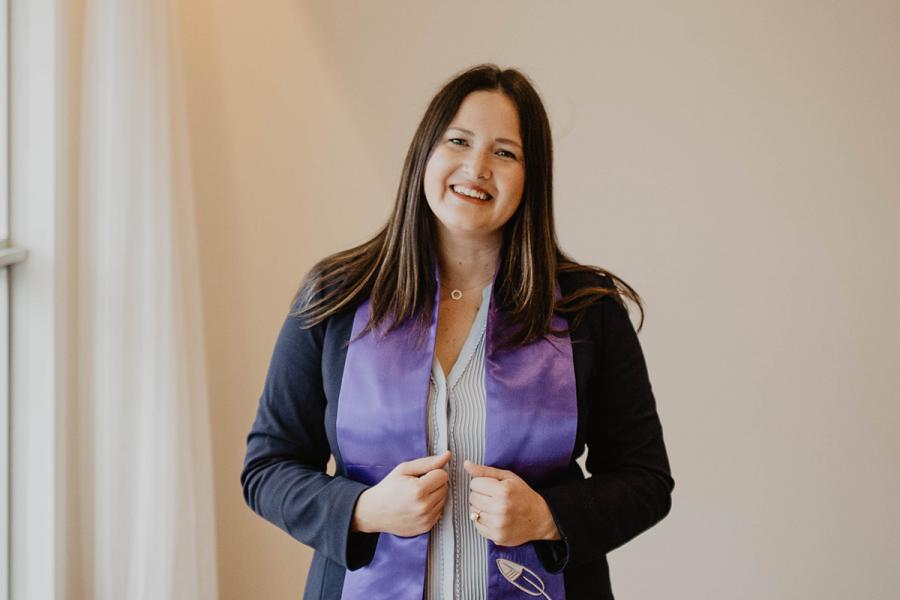
Get to know Asper School of Business Director of Indigenous Business Relations, Katherine Davis
In the classroom and beyond, Davis builds foundations for better questions
The Asper School of Business has appointed three new high-impact academic roles, bringing accomplished faculty members to lead as directors of Indigenous business relations, EDI, and sustainability. These directors will facilitate their specific areas by supporting teaching, curriculum development, research and engagement initiatives.
Instructor and newly appointed director of Indigenous business relations, Katherine Davis [MBA/20] has spent the last 10 years working in cross-cultural settings building relationships with First Nations, Métis and Inuit communities. She is the first Métis faculty member at the Asper School of Business as well as an alum of the Asper MBA and President’s Student Leadership Program.
Davis was appointed director of Indigenous business relations at the Asper School of Business effective July 1, 2024.
Her journey into teaching and leadership began with the Truth and Reconciliation Commission’s (TRC) Calls to Action.
What drew you to this instructor role at the Asper School of Business?
“When the TRC Calls to Action were published in 2015, I really felt that drive to act and pursue a career where I could advance Reconciliation—work that would go far beyond my lifetime.
“I began to think about the skills I would need to work with organizations and make change, which is what led to me pursuing the Asper MBA. I came out of that seeing that there were faculty members and students who cared deeply about the same things I did and finding community through IBEP and other leaders in the MBA program.
“I have worked with IBEP at the Asper School of Business, in change management and in consulting to advance Truth & Reconciliation. During one of my consulting contracts, I completed a scan of educational programming across Canada and saw that there was a lack of depth in education about Indigenous matters, especially in business.
“I realized that I needed to teach in order to create the next level of awareness. I felt I could really make an impact through teaching.”
In 2023, as part of the new BComm curriculum, Davis designed and launched a core course on Indigenous peoples and Canadian business that will continue into the next academic year. She hopes that by providing more engaged education on Indigenous business relations, Asper students can graduate ready to ask more in-depth questions about pressing issues no matter where they work.
—
How did you approach this course? How do you see your role as an educator?
“It has been amazing to create something so interdisciplinary in nature. Designing the course allowed me to be creative while also listening to many people in community.
“As an educator, I really believe that my role is to get people to start understanding who they are in relationship to the thing that they’re learning about. I love seeing that moment when the light bulb turns on and they start to ask more complex questions. There are many questions that still aren’t being asked, and until they are, we won’t get better answers.”
Davis is excited to see how the course will evolve as more faculty members and students get involved, planning new and challenging ways to situate students’ learning in their experience—from guest discussions and living libraries, to consensus building exercises and a celebratory feast.
—
What do you hope to achieve as Asper’s first director of Indigenous business relations?
“Like IDM 2010, there are guidelines as well as space to make the role my own. I am excited to work collaboratively to create a vision for Indigenous business relations here at Asper and start to initiate a Reconciliation action plan for the School.
“Immediately, when this role was offered, I wanted to say yes. I see so much openness and receptiveness within the School to move forward with these initiatives; there’s a will to do our part to move this forward.”
Davis’ journey to this role began with a similar will, a willingness, to listen and take meaningful action toward Truth & Reconciliation. Her response involved seeking opportunities to learn, embracing change and always staying true to herself to align her actions with her values.
In the classroom, she is not interested in teaching students exactly how they should do their part. Instead, she invests time and effort into creating a space where they can voice, develop and find their own responses, uncovering their own journey to action.
As she puts it,
“My goal is to get students to see themselves as a subject in their journey towards Truth & Reconciliation in business.”






